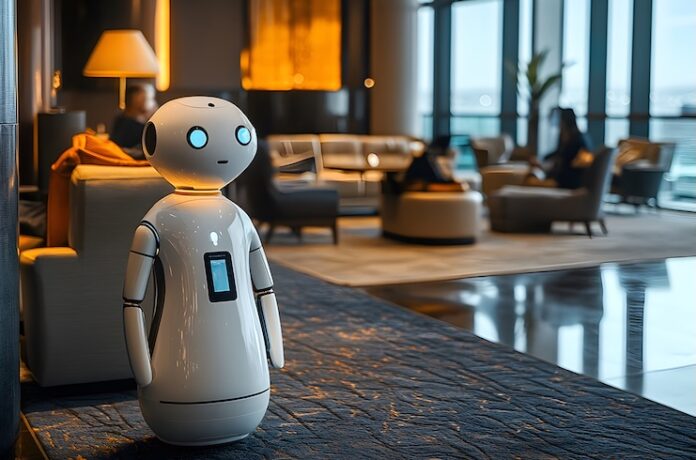
AI is transforming entire industries and sectors, and the hotel industry is no different. With the potential to revolutionize how hotels operate and interact with guests, AI offers unprecedented opportunities for efficiency, personalization, and innovation.
As we look ahead to the rest of 2025, we’re going to see AI being implemented in a variety of ways, ultimately improving operational efficiencies while delivering a new level of guest experience and helping hotel owners stay competitive in an increasingly tech-driven market. Here are four areas where we’ll see AI have the greatest potential:
Guest Experience
AI has the power to enhance the guest experience as it increases opportunities for personalization. For example, many hotels have already started to deploy AI chatbots to handle inquiries, provide guests with recommendations on what to do and where to eat, and assist with bookings at all hours of the day. These types of tools free up time so staff can focus more on personalized service. AI-powered tools that analyze guest data, preferences, booking history, and feedback can help staff tailor each guest experience, whether it’s remembering to reserve a specific suite that a returning guest always stays in or leaving extra pillows and blankets for guests who always request them after checking in.
We may also start to see more hotels implementing facial recognition technology to streamline the check-in process. This technology has the potential to drastically reduce the time it takes for a guest to check in, benefitting both the staff and the guest. Given that these systems can recognize repeat guests, they can also help to tailor each guest experience and provide personalized messages and recommendations upon check in.
Revenue Management
In terms of sales and revenue management, AI-powered analytics can help hotels refine marketing campaigns and dynamic pricing models by predicting demand and identifying trends. As these tools identify local events near each property, they can help manage and monitor occupancy and ADR to the fullest, eliminating the need for managers to do this task manually and maximizing RevPAR. With the type of automation that AI-powered marketing tools provide, they can help staff cut down on time spent on repetitive, time-consuming tasks and empower them to focus on bigger picture, higher impact initiatives. AI can help track stock in real-time while automatically reordering certain supplies before they run out.
Additionally, AI can automate the contract creation process when it comes to corporate business or group bookings. With traditional contract negotiations often involving back-and-forth between the sales team and client, AI can generate contracts quickly and efficiently, using specific terms and preset templates. In addition to rapidly assessing room and meeting space availability, AI can process data on previous bookings and demand to suggest ideal dates and room configurations. It can also assist with event planning by creating layouts for ballroom and meeting room spaces.
Furthermore, the technology can share data-driven insights to help identify opportunities for hotel owners to expand and invest. By identifying potential gaps in the market, AI can help owners target the right customer segments and provide recommendations on which locations to expand in.
Maintenance and Housekeeping
There are many areas where AI can help streamline operations, including energy management and predictive maintenance. With constant updates on what needs to be cleaned, upgraded or repaired in real time, the amount of time rooms spend out of order can be cut down significantly. AI-powered systems can also reduce operating expenses efficiently by tracking, monitoring, and measuring lighting, HVAC, and other utilities. Although utility measurement tools have been available for some time, AI adds another layer of efficiency to the process.
AI can also help track employee performance and provide management with the insights needed to identify opportunities for training and give recognition to outstanding performance and guest service. Additionally, AI-powered tools for scheduling can help improve housekeeping operations as they quickly create schedules with occupancy and guest preferences in mind.
We’re also starting to see the use of robots in hotels. Although most of them have been used in more of a concierge capacity assisting guests with recommendations and inquiries, we may start seeing them as part of the check-in process and beyond. With AI integration, robots have the potential to complete tasks such as folding laundry and cleaning rooms. This may help eventually reduce the number of staff a property needs to hire.
Security
As hotels increasingly collect guest data, security and regulatory compliance is crucial. AI-powered tools can monitor and protect sensitive information, identify vulnerabilities, and ensure compliance with data-protection laws. AI can also be used to enhance overall hotel security by identifying fraudulent activity, unusual booking patterns, and unauthorized access attempts. For example, the technology can analyze and detect any anomalies in transaction data before alerting staff to any potential security threats in real time.
AI can also help automate incident response during a crisis. After detecting and notifying staff of a potential threat, AI can help document incidents in real time while integrating time-stamped video footage in case it is needed for an investigation or legal purpose. This can ultimately help security teams respond faster and potentially mitigate incidents.
As AI technology continues to evolve, its applications in the hotel industry will expand. Emerging innovations like robotic concierges, augmented reality experiences, and advanced analytics promise to reshape the future of hospitality. However, successful implementation requires careful planning, investment in staff training, and a commitment to data privacy and security. With proper safeguards in place and consideration for privacy and ethical concerns, AI has the potential to facilitate operations and ultimately help deliver exceptional experiences that resonate with modern travelers. Indeed, it is already beginning to realize that potential.











